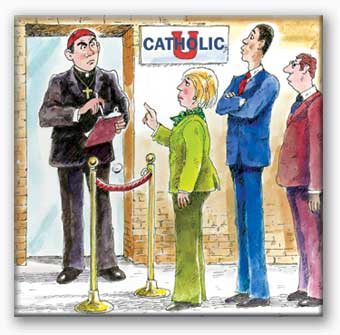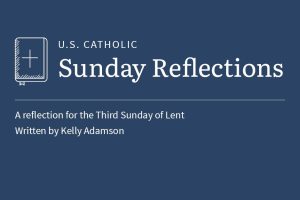Catholic institutions should play host to this year’s electoral contests.
Just when you thought it was safe to go back to Communion, election-year politics are again invading a sanctuary near you. No sooner had Pope Benedict XVI left the United States after his April visit than newspapers started printing stories about just who had received Communion at the papal Masses: Speaker of the House Nancy Pelosi, former New York City Mayor Rudolph Giuliani, Massachusetts Senator Edward Kennedy, Connecticut Senator Christopher Dodd—pro-choice politicians all.
In response to the media reports, a red-faced Archbishop Edward Egan of New York, one of the pope’s hosts, complained that he and Giuliani had a private agreement that the former mayor would not receive Communion. The pope’s other host, Washington Archbishop Donald Wuerl, argued that such decisions were best left up to the local bishop.
It’s to be expected in an election year that the issue should appear once again. But Communion politics aside, none of us should forget the gospel when we enter the voting booth. And as citizens of a nation currently fighting two wars, struggling with a moribund economy, and facing growing, glaring inequalities in income and health care, Catholics have a lot of thinking to do.
Still, many Catholics complain of having to make a Faustian bargain every Election Day: With which devil to deal? Many Democrats seem unwilling to bend to even the narrowest restrictions on abortion while championing embryonic stem cell research. Republicans tend to be death-penalty stalwarts who put roadblocks in the way of any expansion of state-financed health care—most recently for working-class children. And few in either party have resisted the drumbeat of war.
How best to engage this electoral mess? Many of our bishops, unfortunately, have chosen some combination of punishment and withdrawal. During his state’s Democratic primary, Bishop Donald Trautman of Erie, Pennsylvania announced he would boycott the graduation of Mercyhurst College in his diocese because it hosted a Hillary Clinton “town hall meeting” event. Trautman wrote that he was disappointed in the college because Clinton does not share the church’s opposition to abortion. (Trautman imposed the same sanctions on a university that invited then-Homeland Security Secretary Tom Ridge, a pro-choice Republican, to speak a few years ago.)
Trautman is among our most thoughtful and moderate bishops, and I do not for a second doubt his sincerity. But I worry that in taking such action, he’s effectively saying that a Catholic college—or any Catholic institution for that matter—can’t actively participate in the political process.
After all, no political party and few if any individual politicians can claim conformity with the church’s agenda. Focusing on abortion, for instance, falls more heavily on Democrats, and some pundits have even used that single issue to claim that Catholics must vote for the GOP, which, as the past eight years have demonstrated, is hardly the standard-bearer for a consistent ethic of life.
I’m not saying that the bishop shouldn’t have made some statement about Clinton’s appearance. In fact I would argue that Trautman should have insisted on a meeting with the candidate for a frank discussion about policy, from abortion to poverty to war. Instead of denouncing politicians or their policies from a distance, why not seek some face time for a real exchange of ideas, especially when they’re on our turf?
No matter how we Catholics and our leaders decide to interact with our political process this election year, what we absolutely cannot do is disengage from the debate.
As Christians and citizens of the world’s most powerful nation, we have a moral obligation to carefully consider the demands of the gospel when we make choices about the future of our nation and our world. That obligation includes speaking as Catholics, arguing from Catholic principles, and using our Catholic institutions as venues for engaging the candidates. If politicians want Catholic votes, let them come to us. Besides, as any college sports team knows, it’s always better to have home-court advantage.















Add comment